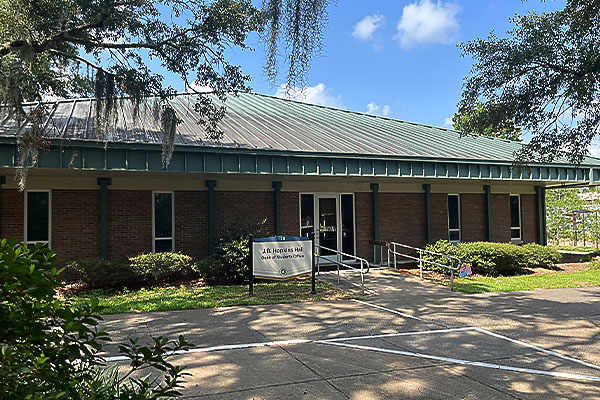Drug Free Campus
This publication is distributed by the Dean of Students Office and Human Resources in accordance with the requirements of the Drug Free Schools and Campuses Act of 1989 and the Campus Security Act of 1990.
An academic community is harmed in many ways by the abuse of alcohol and the use of other drugs. These high-risk behaviors lead to decreased productivity, serious health problems, strained social interactions and impaired learning.
Standards of Conduct
The University of West Florida is committed to a healthy, safe environment for learning, living and working. Students, faculty, staff and guests are expected to comply with all federal, state and local laws as well as University rules and regulations concerning alcoholic beverages and other drugs. Specifically, the University prohibits the unlawful possession, use, manufacture or distribution of alcohol or controlled substances in or on University property or as part of any of its activities. Controlled substances include, but are not limited to, marijuana, cocaine, cocaine derivatives, heroin, amphetamines, barbiturates, LSD, PCP, tranquilizers, inhalants and associated paraphernalia.
Sanctions
The University will take disciplinary action for violation of its standards of conduct regarding alcohol and other drugs. For students, the process is delineated in the current edition of the Student Handbook under “Rights and Responsibilities.” For employees, the process is provided in the UWF Employee HR Policies.
Sanctions imposed upon students may range from oral and written warnings to restriction, probation, counseling, suspension or expulsion from the University. Employee sanctions may range from oral and/or written reprimands, mandatory participation in an Employee Assistance Program and/or termination of employment.
Disciplinary action by the University does not preclude the filing of criminal charges against a student, employee, or guest, nor does the filing of criminal charges prevent the University from taking disciplinary action.
It's The Law
Numerous federal, state and local laws provide for a variety of legal sanctions and penalties for the unlawful possession or distribution of illicit drugs and alcohol. These sanctions include, but are not limited to, incarceration and monetary fines.
The Federal Controlled Substances Acts provide penalties of up to 15 years imprisonment and fines of up to $25,000 for unlawful distribution or possession with intent to distribute narcotics. For unlawful possession of a controlled substance, a person is subject to up to one year of imprisonment and fines of up to $5,000. Any person who unlawfully distributes a controlled substance to a person under twenty-one years of age may be punished by up to twice the term of imprisonment and fine otherwise authorized by law.
State laws and local ordinances also prohibit illicit drugs and alcohol. Copies of these laws, as well as University policies and regulations, are available at the following locations:
- Human Resources
- Department of Public Safety and Security
- Dean of Students Office
- Counseling and Psychological Services
Health Risks
The use, misuse and abuse of alcohol and other drugs, both legal and illegal, can have serious consequences to health and well-being. Alcohol and other drug use can lead to psychological and/or physiological dependence and addiction. Information on specific health risks associated with alcohol and other drugs is summarized below and is available in more detail at the following campus locations:
Alcohol is a central nervous system depressant that can impair coordination, inhibitions, self-control, memory, judgment, and reflexes. Large quantities may produce staggering, slurred speech, mood changes, unconsciousness and possibly death. Prolonged use can damage many organs of the body, including the heart, liver, stomach and pancreas.
Marijuana can increase heart rate, interfere with sexual development, may cause a reduction in male fertility and disrupt the female menstrual cycle. It can increase the risk of disease/damage to the body’s respiratory system and impair eye-hand coordination and other essential functions needed to operate a motor vehicle safely. It can also impair the body’s immune system.
Cocaine can cause feelings of depression, inability, impatience and pessimism. It can also cause severe weight loss, anxiety, hallucinations, increased heart rate and blood pressure. Cocaine has caused death by convulsion, failure of the respiratory system and by heart attack.
Over-the-counter and prescription drugs can also cause drug tolerance, dependence and addiction. The potential for misuse and abuse is increased with these drugs as they are easily obtainable and safe as far as ingredients and manufacturing, and the user may tend not to follow specific instructions for dosage and frequency. Many legal drugs also have a long shelf life, leading to their use after they are no longer needed or for self-medication without medical supervision.
Interaction between various drugs, legal and illegal, may have serious consequences for the user. Various combinations of drugs may work at cross purposes within the body, and the combined effects of two or more drugs may be more potent than the effect of a single drug.
Club drugs such as MDMA (Ecstasy), GHB, LSD, Rohypnol, Ketamine and Methamphetamine can cause serious health problems and possibly death. Many of these drugs are tasteless and odorless. The chemicals, drug sources and pharmacological agents used to manufacture these drugs often vary, making it difficult to determine all of the effects, symptoms and health risks associated with club drugs. Confusion, depression, impaired motor function, amnesia, psychotic behavior, cardiac failure and permanent neurological and organ damage are some known effects associated with the use of these drugs.
Counseling, Treatment, and Re-entry Programs
The Counseling and Psychological Services (CAPS) staff are available by appointment or on an emergency basis to assist with alcohol and other drug related problems. Contact CAPS is confidential.
Student Health Services personnel are available during normal hours to deal with any alcohol or drug related emergency, answer questions, and provide information. (After hours 2911 or 850.474.2911 should be dialed to obtain assistance in an emergency.)
The Wellness Services provides a confidential referral service with regard to alcohol and/or other drug problems; information on various aspects of alcohol and other drug use, misuse and abuse; and a reference library for personal and academically related research.
The University’s Employee Assistance Program (EAP) is available to employees to obtain counseling and/or treatment for an alcohol or other drug related problem. Employees are entitled to four (4) sessions at no charge through the EAP program, which is coordinated by the Center for Personal and Family Development (CPFD). After these sessions, treatment is coordinated through the employee’s individual insurance plan. CPFD may be called directly at 850.438.4007. This service is confidential.
Re-entry programs for students and employees are handled on a case-by-case basis through the Office of Student Affairs and Human Resources, respectively.
Crime Awareness And Campus Security
Crime statistics are provided as part of the University of West Florida's commitment to safety and security on campus and comply with the Jeanne Clery Disclosure of Campus Security Policy and Campus Crime Statistics Act. This information is found in the Student Handbook Combined Annual Security & Fire Safety Report 2022-23.
Student Conduct
The University of West Florida is dedicated to the advancement of knowledge and learning and to the development of ethically responsible persons. University students are expected to uphold appropriate standards of behavior and to respect the rights and privileges of others. Student conduct is expected to be lawful and in accordance with all federal, state, and local laws and university regulations. In keeping with the University of West Florida’s stated essential values, sanctions imposed on students found in violation of the Student Code of Conduct are designed to promote the university’s educational mission. Furthermore, sanctions are imposed for the purposes of restoring the standards of the university community, educating students about the seriousness of their action(s) and promoting civility and positive growth while maintaining the safety and integrity of the individuals involved and the university community. The processes for adjudicating violations of federal, state and local laws and violations of the Student Code of Conduct are separate and may be pursued independently of one another. Read more about the UWF Student Code of Conduct.
Contact Numbers
UWF Contact Numbers |
|
| Wellness Services | 850.474.2254 |
| Counseling and Psychological Services | 850.474.2420 |
| Student Health Services | 850.474.2172 |
| Human Resources | 850.474.2694 |
| University Police | 850.474.2415 |
| Dean of Students Office | 850.474.2384 |
Local Contacts |
|
| AA/Alanon Answering Service (24 Hours) | 850.433.4191 |
National Contact Numbers |
|
| Alcohol and Drug Abuse | 1.800.729.6686 |
| American Council On Alcoholism | 1.800.527.5344 |
| Referral and Drug Information | 1.800.662.4435 |




